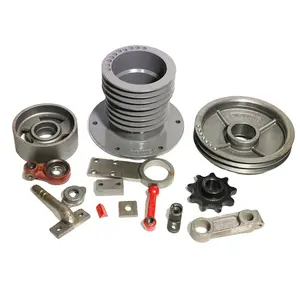
OEM High Quality Die Casting Parts Sand Metal Cast Lost Wax Investment Wheels Precision Cast Iron Components Foundry Supplier










A lead ingot is a dense metal block formed by melting and pouring lead into molds, commonly used in industries like plumbing and ammunition. The lead ingot mold process involves heating lead until it liquefies, then carefully pouring it into molds to create rectangular or cylindrical shapes. These pure lead ingot pieces typically feature markings indicating weight and purity. Despite their industrial significance, it’s crucial to handle lead with caution due to its toxic nature, minimizing environmental and health risks during use and disposal.
A lead ingot is known to offer several benefits in different industries. Firstly, it makes it simpler to use lead in construction and manufacturing. This is because the lead ingots possess a standard shape and size, making them easy to handle and transport. The markings on the ingots are deliberately done to serve a purpose. The information about their weight and purity is to ensure that only the right amount of lead is used for specific applications. Secondly, lead ingots are also used for recycling purposes. That means when a lead gets old or isn’t needed anymore, these ingots make it simple to recycle and use the lead again for new projects. Thirdly, lead ingot molds are commonly used in plumbing for the production of lead pipes, fittings, and seals. This is due to lead ingot properties like malleability and resistance to corrosion. Fourthly, lead’s high density makes it an effective component for radiation shielding in medical facilities, laboratories, and nuclear-related industries. This helps to provide crucial protection against harmful radiation exposure.
A good lead ingot should essentially have a consistent weight and size, ensuring uniformity in applications such as construction and manufacturing. The purity of lead is crucial, and a high-quality ingot will contain the minimum impurities. Additionally, its surface should be smooth, ensuring proper cooling and solidification during the manufacturing process. Plus, a quality lead ingot meets industry standards, with proper markings depicting its composition and properties.
Lead ingots are available in various types based on their composition and applications. One common type is refined lead ingots, produced by processing lead ore to get rid of impurities. They are often employed on manufacturing and construction sites. Another type is recycled lead ingots, made from refining and melting existing lead products. These standardized units promote sustainable practices. Then there are alloyed lead ingots, typically made by incorporating metals like antimony or tin. They can be used for diverse applications, like battery production.